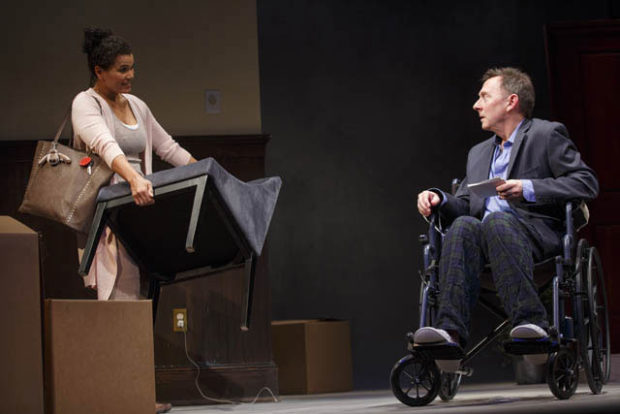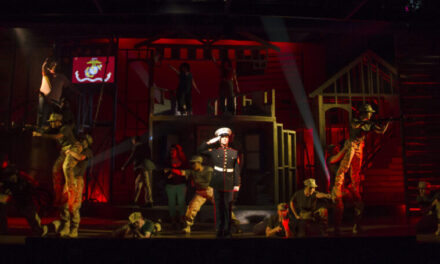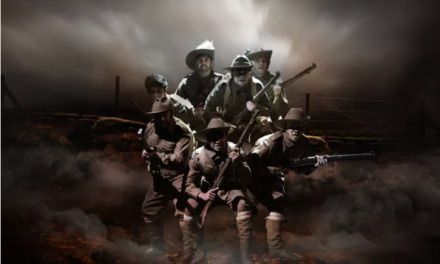Audacious risk-taking in the theater comes in many colors, most of them loud. You can defy a censor, transgress a casting convention, shatter a shibboleth, violate a hallowed genre tradition, inject “low” or outside influences, force structural change in a stodgy institution—the possibilities are legion.
Every once in a while, though, an especially innovative artist like Will Eno appears whose audacity is instead quiet and understated. It involves dispensing with almost all the splashy theatrical tools that others might consider essential and standing aloof from the egotism and showmanship that usually drive the art, to say nothing of the industry. This sort of minimalist high-wire act is the legacy of Beckett and Symbolism (think Maeterlinck), and fine examples of it are exceedingly rare.
Eno doesn’t work this way all the time, but the Eno plays that have struck me most deeply—Thom Pain (2005), which launched him, and his new Wakey, Wakey, now at Signature Theater in a production he directed—have been quintessentially Beckettian. They are brief, bare-bones creations whose deliberately flimsy, sham fictional circumstances are like gossamer fabrics that become strangely substantial for reasons you can’t necessarily pinpoint.
Like Beckett, Eno trusts our desire and ability to see through his spurious surfaces and invest in their theater-as-life metaphors, which invariably peter out or break down in glum, hilarious, and provocative ways. Because we laugh and are treated as smart, we’re moved to explore the grave and essential matters beneath the dumb jokes: questions, for instance, of what any of us is doing here, or what our time is worth. Time is framed and emphasized by Eno’s spare circumstances, stripped down to what’s intrinsic to theater—living people gathered together to watch other living people fill some of their utterly irreplaceable minutes. These bare facts are more or less thrown in our faces like irritating candles held up to mortality.
The title Wakey, Wakey is purposely silly and childish—something you might say to wake up a kid or make light of a funeral. The play was in part Eno’s response to the illness and death of Signature’s artistic director James Houghton last year.
It opens by introducing a guy (named Guy) in a flash of light, sprawled on the floor like a beached dolphin. He says fervently: “Is it now? I thought I’d have more time.” Michael Emerson plays this role with unforgettable clarity and nuanced simplicity. He spends most of his time in a wheelchair, speaking easily to us like visitors to a sick room, or fellow patients, or game-partners, or seminar participants, or maybe just theater spectators.
The set is a nondescript room with largely empty walls, a freestanding door that is never used and feels vaguely ominous, a pile of clothes and plain cardboard packing boxes strewn about the floor (design by Christine Jones). This could be a hospice, a hospital waiting room, a home. In any case, it’s decidedly liminal, neither here nor there, newly impersonal as someone is obviously moving out.
Guy is pleasant with us, but serious. We learn little about him (he was a swimming and diving coach) but get it early on that he’s very ill, probably waiting to die. He winces in pain, fails to eat a sandwich, seems contemplative, concerned about calling for help. But then at other times he walks out of the wheelchair (slowly), tells wry jokes, and summons projections and sound effects like a Thornton Wilder stage manager.
He has mortality on his mind, informing us, for instance, that 100,000 people died yesterday, and the day before, and the day before that. Yet he hates to put us off:
“Oh, but we’re not here to mope, right? We’re here to listen to music and drink some grape juice, maybe get a free T-shirt. We’re here to say good-bye, of course—there’s always someone or something to say good-bye to, and it’s important to honor the people whose shoulders we stood upon and fell asleep against. So, yes, we’re here to say good-bye and maybe hopefully also get better at saying hello. To celebrate Life, if that doesn’t sound too passive-aggressive.”
That last remark, as well as the T-shirt dig, are vintage Eno, like the snide cracks in Thom Pain, courtesies that aren’t courteous, acknowledging the unavoidable buildup of sentiment but complicating it, welding it to something tougher and more direct.
Guy is a dying man who knows he’s a spectacle and evidently wants to make “something light and real and lasting” out of whatever his stage presence amounts to—“Until it’s gone, I guess,” he adds. At first, he consults a pile of note cards he has prepared but over the show’s 75 minutes he grows hazy and forgets and drops them.
He speaks of gratitude, asking us to shut our eyes and think of an important person from our past, shows a photo of a girl licking ice cream, shows a video of animals screaming that includes a frame of Pavarotti, offers passing comments, not always coherent, about bones, cells, tunnels, trains, saliva, Saltines, and much more. The triviality and arbitrariness are themselves moving. We witness memory beginning to disintegrate, the intangible weight of that. We hear a truck passing in the distance, a siren, galloping horses as an ancient picture of horses on a cave wall appears.
Yet for all the poetry of this, it’s Emerson’s performance that gives the play potency. His intelligence, intensity and humor, his lack of self-pity and concentrated commitment to every whimsical and accidental moment that punctuates Guy’s peculiar farewell routine: all this is what infuses the play with loving, lumpy humanity and taut suspense.
It also helps that the play’s late-arriving second character, a caregiver named Lisa, is played with the same no-b.s. intensity by January LaVoy. She casually mentions the real time. And she speaks to the fading Guy simply, practically, and straightforwardly, providing basic physical care and pleasant companionship without embellishment or empty reassurance. At one point he falls asleep and she suddenly, un-showily performs a little ceremonial dance, something like a yoga sun blessing, and seems otherworldly for a moment.
The effect of this is inexplicably heartbreaking, a benediction for the hour and a quarter we’ve all spent pondering the materiality of nothing, a fleeting, lyrical respite from the awful tyranny of the clock. But that spell is itself suddenly broken as balloons and bubbles fall from the ceiling and a disco-ball flashes to party music. As we leave the baffled crowd gathers around free figs and coffee cake in the lobby. A veritable feast.
This article was first published on www.jonathankalb.com and reposted with permission from the author. Read the original article here.
This post was written by the author in their personal capacity.The opinions expressed in this article are the author’s own and do not reflect the view of The Theatre Times, their staff or collaborators.
This post was written by Jonathan Kalb.
The views expressed here belong to the author and do not necessarily reflect our views and opinions.


















